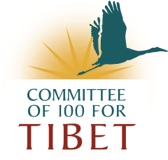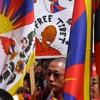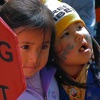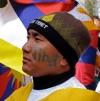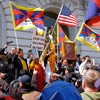For over one thousand years, the Tibetan people maintained a sovereign national identity distinct from the national identity of China. In 1950, the People’s Republic of China invaded Tibet and embarked on a policy of occupation and oppression that seriously threatens the continued survival of the unique cultural and religious identity of the Tibetan people. We are extremely concerned about the human rights abuses in Tibet. Tragically, a world that condemns colonialism has largely ignored China’s occupation of Tibet.
The human cost to the Tibetan people has been of tragic proportions. Hundreds of thousands of Tibetans were killed outright or died as the result of aggression, torture or starvation. Over 6,000 monasteries and temples were destroyed.
The repression of the Tibetan people in their own land continues to this day and compounds the illegitimacy of the Chinese rule. China denies the Tibetan people’s right to democratically elect their own political representatives. The use of the Chinese language in Tibetan schools and as the effective official language of Tibet represses Tibetan culture and has marginalized many Tibetans. Tibetans are aggressively prevented from freely pursuing their religious practices. Chinese policies have encouraged Chinese settlers to the point where Tibetans have become a minority in many areas of Tibet. Major economic development decisions for Tibet are made in Beijing and benefit Chinese settlers and officials more than Tibetans. Tibet’s natural resources are being exploited and its environment seriously imperiled with little regard for the wishes of the Tibetan people.
The Tibetan people have demonstrated repeatedly against the Chinese occupation. Their struggle is nonviolent and worthy of our special attention. Indeed, in 1989, the international community honored the Tibetan freedom movement when the Dalai Lama, the spiritual leader of the Tibetan people, was awarded the Nobel Peace Prize and, in 2007, he received the U.S. Congressional Gold Medal in recognition of his advocacy of peace, tolerance, human rights, non-violence, and compassion throughout the world.
We have joined together in the Committee of 100 for Tibet to support the Tibetan people’s struggle. We ask the peoples and nations of the world to recognize that Tibet is occupied by the People’s Republic of China and demand the cessation of practices that deprive the Tibetan people of their basic human rights and fundamental freedoms, including their right to self-determination.
